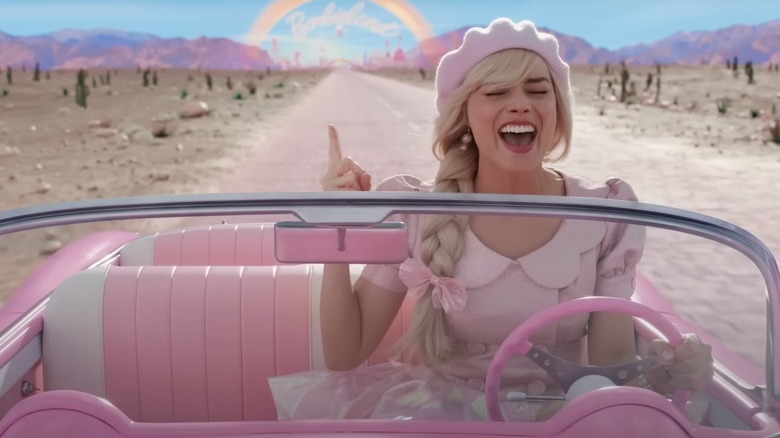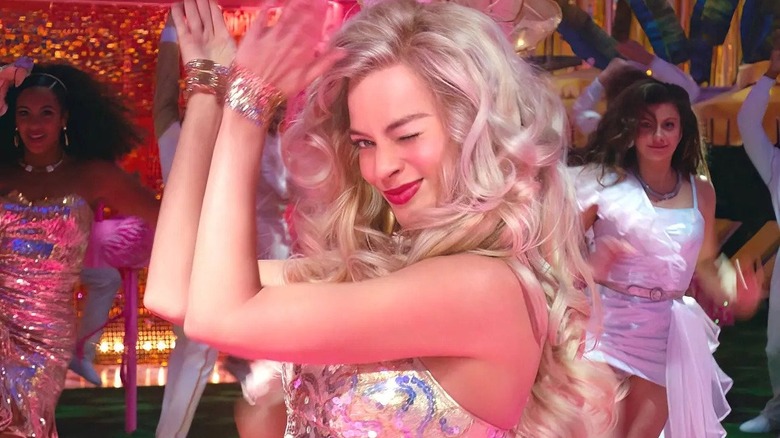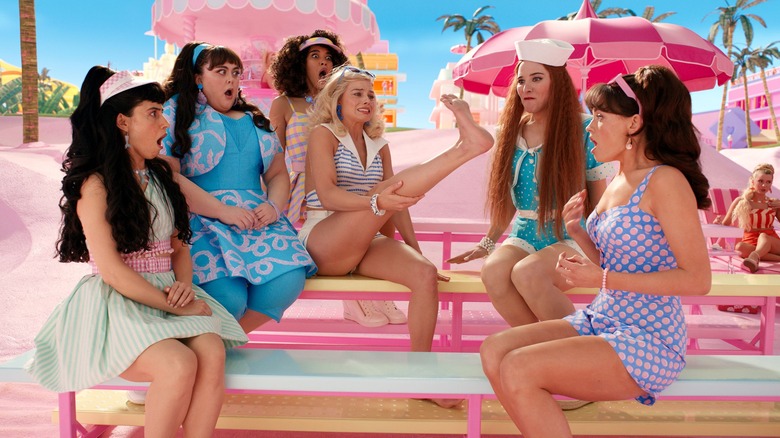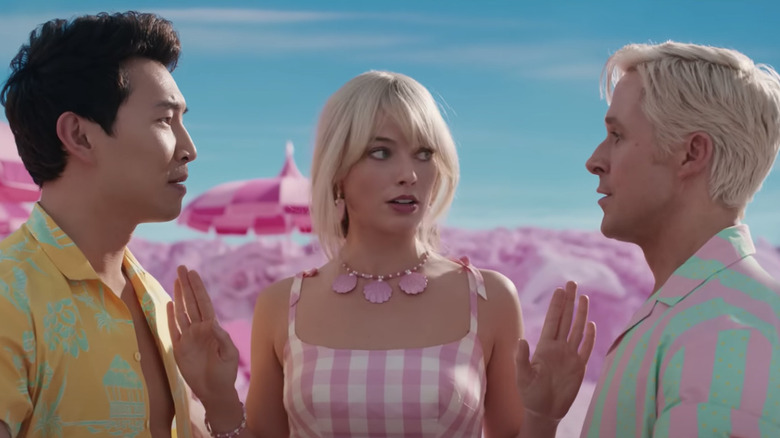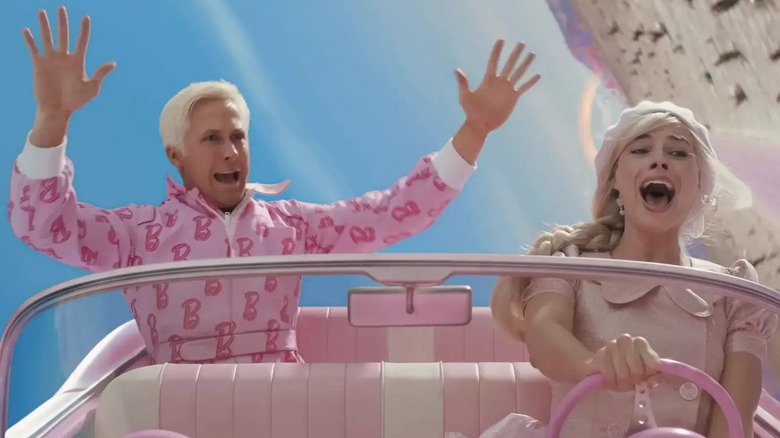Margot Robbie Was Surprised That Mattel Got 'On The Ride' With Barbie So Quickly
Cinema, like many other art forms, is a constant struggle between the financial and the creative forces that work to put each project on screen. The making of the buzz-worthy film "Barbie" was no exception — in fact, it was the perfect symbiosis. Writer-director Greta Gerwig has long been in the sphere of independent cinema as an actress and more recently as a filmmaker herself. When she was first tapped by star and producer Margot Robbie to make a film about the iconic doll, they were worried that there would be major pushback from Mattel executives that wanted their doll painted in a flattering light. Much to their surprise, the toy company provided a lot of creative freedom — more than they ever could have expected.
Robbie isn't just starring in the summer blockbuster, she has also been heavily involved in the creative process since the film's conception through her production company LuckyChap. The actress first met with Mattel higher-ups in 2018, and she was prepared for them to turn her away. She and Gerwig had a lot of ideas for the film, and not all of them depicted Barbie very favorably.
"In that very first meeting, we impressed upon Ynon [Kreiz, Mattel CEO] we are going to honor the legacy of your brand, but if we don't acknowledge certain things — if we don't say it, someone else is going to say it," Robbie revealed to Time. "So you might as well be a part of that conversation."
Mattel evidently took this advice to heart. The executives embraced some really critical moments and themes, even when some had their misgivings about how it might impact their product's sales and reputation.
The movie pokes fun at Mattel, embodied by Will Ferrell
The "Barbie" star was prepared to face some pushback from Mattel when she first read Gerwig's script. Not only was the company shockingly supportive, they even allowed a satirical representation of themselves into the film, one of whom is played by the unstoppable comedic force that is Will Ferrell.
"I wish we could have recorded some of the initial conversations, because they were so funny, and actually some of them, in some ways, ended up in the movie," Robbie told Screen Rant. "But Mattel were incredible. When I first read the script, I was like, "We'll never make this movie, and that's such a shame, because it's such a great script, but there's no way Mattel is agreeing to this."
Mattel executives are painted so ridiculously in the film that they almost match the hyperreality of Barbieland more closely than the human world. This satirical element of the film, commenting not just on the doll but the company that makes it directly, supplements the existing themes and gives it a new depth of awareness.
"Not only do they play a character in the movie, they're depicted as this heightened reality bridge between Barbieland and reality, and it's so absurd and so funny," Robbie continued. "But it's very self-aware. We're poking jokes, so I just can't imagine any other corporate company that big with IP that is as valuable to them as Barbie is and allowing us to make the jokes and say the things that Will Ferrell specifically was saying." Luckily, as Robbie said, "They were so brave and so supportive."
Mattel made major changes before bringing Barbie to the big screen
Mattel was surprisingly accepting of a self-critical film in part because they had already responded to these criticisms through their products. The company had been "toying with the idea" of making a movie about Barbie since 2009, Time reported, but wanted to update their brand before putting it under a microscope. They worked to counteract the homogenous beauty standard that Barbie previously maintained by introducing new Barbies of varying skin colors and body types. This shift in the product allowed Robbie to feel comfortable making the film, and she insists that she wouldn't have even made "Barbie" if she was the only one.
"If [Mattel] hadn't made that change to have a multiplicity of Barbies, I don't think I would have wanted to attempt to make a Barbie film," she confessed to Time. "I don't think you should say, 'This is the one version of what Barbie is, and that's what women should aspire to be and look like and act like.'"
The company wanted "Barbie" to reflect the many new faces of the brand while voicing the criticisms that had inspired this change — even if that meant a dip in sales. "It's not about making movies so that we can go and sell more toys," added Mattel CEO Ynon Kreiz. "We've been doing well selling toys without movies."
But Kreiz and his colleagues did have some misgivings about Gerwig's script at first. Robbie admitted that "at the beginning, they were kind of white-knuckling it," per Screen Rant. "And we're like, 'It's okay, we're all on the ride together!' They just trusted Greta, they trusted the process. They haven't made movies out of the Mattel IP before, so this was a big thing, and they could not have been cooler about the whole thing."
So why did Mattel trust Gerwig with a project that could potentially threaten their business?
Gerwig was stressed out for Mattel
It was in one of her very first pitch meetings with Mattel that Gerwig managed to convince the company that she was the right filmmaker to undertake this massive project — and that she would be capable of preserving their brand while poking a little fun at it.
"I think at that point, when I was in hour three of talking, they all realized no one has thought more about this," the writer-director recalled in an interview with Rolling Stone. "They saw I wake up every morning and panic about proportions and color saturation. And they were like, 'We don't have to panic. She's already panicked about this.' And I think that gave them a sense of comfort."
Despite Gerwig's intensity, Robbie wasn't so sure that Mattel would produce a script with such critical and adult themes. Having signed on as a producer before Gerwig was on board, she made sure that the toy company and production studio gave Gerwig and her co-writer Noah Baumbach as much freedom as possible. The result was an incredible story, but the actress was still concerned that these artistic liberties would blow up in their face.
"We worked hard to give them their space and let them come up with what the movie was going to be, uninterrupted, without people pushing an agenda on them—not Mattel, not Warner Bros., not us," Robbie told Time. "And then when I saw the script, I was like, 'They're never going to let us do this. This is really pushing it.'"
Even though Mattel greenlit the script, there was no guarantee that they would remain hands-off during the entire process. They ran into some small creative differences — Mattel wanted one scene changed, but Gerwig and Robbie talked them out of it. Luckily, they were pleasantly surprised with the powers that be.
Gerwig was shocked that studio execs okayed this scene
In the end, Gerwig and Robbie managed to preserve the script's integrity while benefiting from Mattel and Warner Bros.' combined financial resources. It was a concern for Gerwig (who had previously worked primarily with independent studios like A24) to answer to so many suits, but she feels that the big-budget approach ultimately worked in the film's favor.
"The movie in its conception and even from the script stage was always a wild ride," Gerwig told Rolling Stone. "But I think that in the execution of it and the directing of it, it allowed me to go even farther, and to make it even more like a candy-colored explosion of things that people didn't necessarily think would be the Barbie movie." She continued, "But, yeah, I can't account for it, but I'm thrilled to bits that they let me do it this way."
But the more satirical or over-the-top moments in "Barbie" weren't the ones that Gerwig expected to be cut by the higher-ups — it was small moments like Barbie seeing an old woman for the first time, which had no real bearing on the plot, that Gerwig feared wouldn't make it into the final product.
"There's the more outrageous elements in the movie that people say, 'Oh, my God, I can't believe Mattel let you do this,' or, 'I can't believe Warner Bros. let you do this,'" the filmmaker added. "But to me, the part that I can't believe that is still in the movie is this little cul-de-sac that doesn't lead anywhere — except for, it's the heart of the movie."
Barbie might be a wild ride, but it's also a lucrative one
Robbie insists that the film is "not a Barbie puff piece," per Time, but that doesn't mean Gerwig didn't have some misgivings about going corporate. Mattel has a larger plan to create film franchises from even more of their IP, including a Hot Wheels movie produced by Star Wars alum J.J. Abrams and a Barney film with "Get Out" actor Daniel Kaluuya in talks to star. Even if Mattel doesn't aim to sell more Barbies by making this film, they still stand to capitalize further off of her, and it's hard to imagine that their financial interests had no bearing on the content of the film whatsoever.
Gerwig admitted to Time that "sometimes these movies can have a quality of hegemonic capitalism," but she attempted to subvert this quality in her own film. "It's like sneaking in humanity to something that everybody thinks is a hunk of plastic," she explained.
Whether "Barbie" ends up being good press or bad press for Mattel, it is still a smart financial move for the company and an adventurous creative challenge for Gerwig, who has never before helmed a major studio production. If the toy company and Warner Bros. really did give her and Robbie the creative freedom that they claim, this could be a very interesting meta-moment — and maybe even a turning point — for franchise filmmaking.
